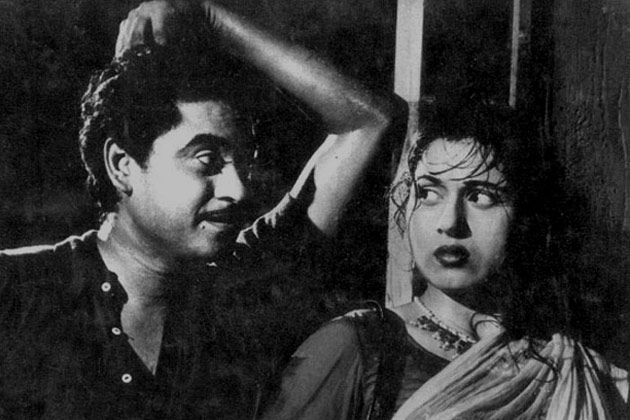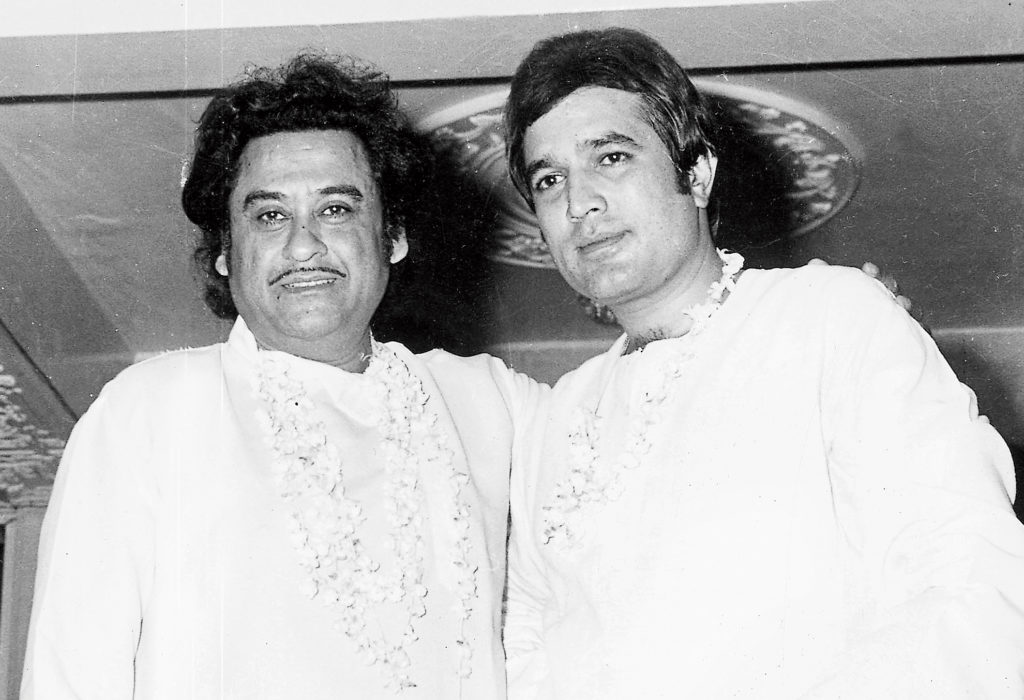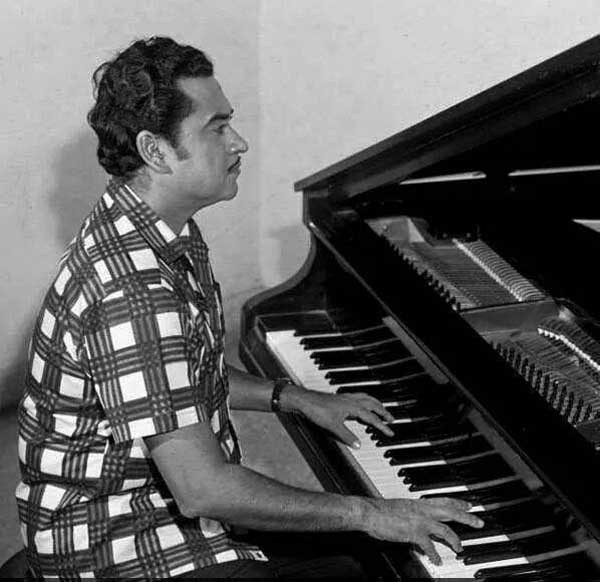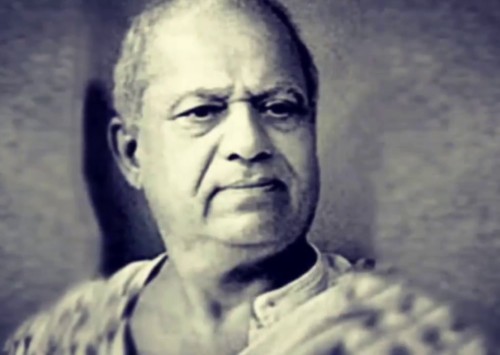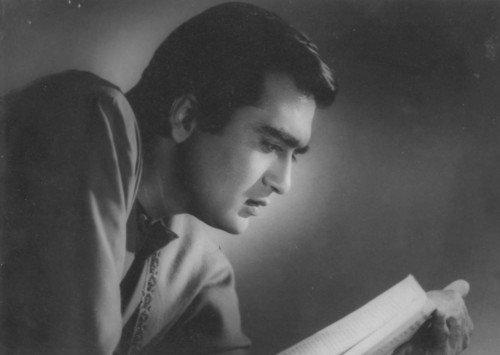Remembering the multifaceted Kishore Kumar
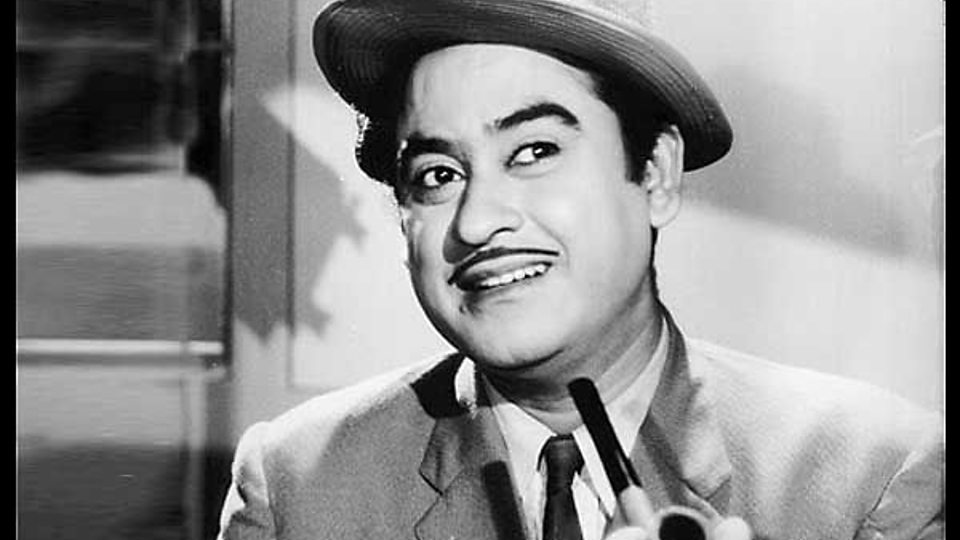
Kishore Kumar is one of the few yesteryear singers whose compositions are enjoyed equally by older as well as younger generations till date
When melodies of the past are talked about, mention of the multifaceted Kishore Kumar is inevitable. While he had aced acting, directing, producing, writing as well as singing, his evergreen compositions are enjoyed by people from all generations, even today. Here are a few chapters from his life on his 90th birth anniversary.
On a rainy day, at Delhi’s Sudama tea stall, people from all age groups are sitting and enjoying pakodas (fried Indian snacks). While some are discussing politics, some climate change and some cinema, others are exchanging stories from their personal lives. While this everyday monsoon routine of people from all walks of life is replaying itself, on the radio is playing a song Ek Ladki Bheegi Bhagi Si (a rain-soaked girl), a melody from 1958. The song starts a trail down the memory lane reminiscing a multi-talented gem of the Indian film industry who aced acting, script writing, composing, direction, production as well as singing with equal perfection and won the heart of millions. It has been more than three decades since Kishore Kumar left for the heavenly abode, but the love amongst the audiences has only grown over these years. He is one of the few people from film fraternity whose evergreen songs are being rejoiced for over six decades now and are admired equally by the older as well as younger generations.
On and beyond the silver screen
Kumar was passionate about singing since a very young age. Inspired by the singing sensation K.L Saigal, poet Rabindra Nath Tagore and Danny Kaye, the voice of the Hollywood, singing was no less than meditation for him. He even had the posters of these legends in his living room to remind him of his connect with the world of music.
While being the younger brother of Ashok Kumar, an already established name of the tinsel town, acting was thrusted upon him; singing continued to be his mistress. Though he had not acquired any professional training, singing in a chorus in Bombay talkies in the early 1940s marked his entry in the Indian film industry. Kumar made his first appearance on the silver screen with Savak B. Vacha’s Shikari (1946) in which Ashok was playing the lead role. However, reluctant to act, Kishore Kumar did not hesitate to test the patience of his directors and producers and disagreed to cooperate. His dislike for acting was no longer behind the wrap and was reflected in the flops that he was delivering.
“I only wanted to sing. Never to act. But somehow, thanks to peculiar circumstances, I was persuaded to act in the movies. I hated every moment of it and tried virtually every trick to get out of it. I muffed my lines, pretended to be crazy, shaved my head off, played difficult, began yodeling in the midst of tragic scenes, told Meena Kumari what I was supposed to tell Bina Rai in some other film – but they still wouldn’t let me go. I screamed, ranted, went cuckoo. But who cared? They were just determined to make me a star,” he once told in an interview.
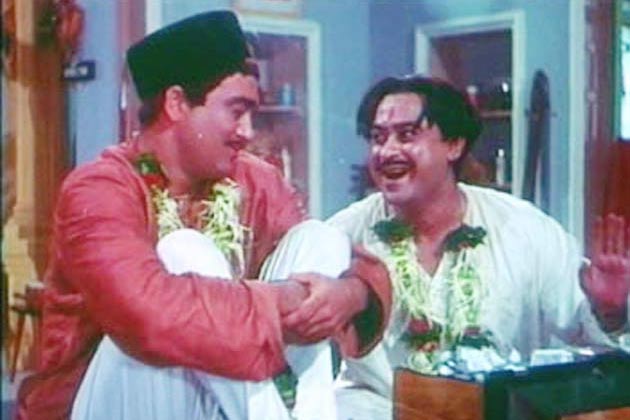
Kishore was appreciated not just for his songs but also for the comic role he played besides Sunil Dutt in the 1968 film Padosan
It was only after he did a dozen films including Naukri (1954), Baap Re Baap (1955) and Char Paise (1955), that he developed a liking for this art and thus began the second innings of Kumar as a method actor.
Although he did a few songs this while, it wasn’t until the early 1950s that Kumar took up the role of a playback singer after R.D Burman, another singing sensation of that time, recognised Kumar’s singing talent. He delivered several super hit songs including Zindagi Ek Safar Hai Suhana, Chala Jata Hoon, Hal Kaisa Hai Janab Ka, Eeena Meena Deeka and Pal Pal Dil Ke Paar, which are enjoyed till date.
He introduced in Hindi cinema a unique form of singing inspired by Jimmie Rodgers and Tex Morton; yodeling. Kumar and yodeling became synonymous.
Knack for perfection
For Kumar, perfection was everything. Soon the word about his knack for perfection spread in the industry. He started recording five to six songs per day, besides playing a myriad of roles in films. He did not hesitate to experiment with various shades of songs he sang or the roles that he portrayed. He delivered every emotion be it love, gloom, comedy, fear or the spirit of carpe diem, with equal perfection.
He was known for getting into the skin of the character and living the exact emotion of the songs he sang. For one of his famous songs Khaike Paan Banaras Wala, he chewed a real Banarasi Paan (a preparation of betel leaf filled with ingredients like areca nut) for experiencing its true essence and delivering it to the song.
Once, when Lata Mangeshkar could not turn up for recording a song for the 1962 classic cult, Half Ticket, Kumar took it upon himself to sing both the male as well female parts of the song Aake Seedhi Lag Dil Par. The song was a super-hit with the audiences.
Kumar used to adapt the minute behavioural details and mannerism of the actors whom he used to sing for so well that he started becoming their voice. For the then superstars Dev Anand and Rajesh Khanna, none of the other singers were signed. The audience had accepted him as their voice.
He also recorded several tracks in other languages including Bengali, Marathi, Assamese, Gujarati, Kannada and Odia.
A man of sadness
A colourful Kishore Kumar on screen had a grey story back at home. While he was busy creating history, his personal life was struck by discord. With thousands of fans across the globe and a lifestyle that many fancied, aloofness took a toll over his personal life. “I don’t have any friends. People bore me. Film people particularly bore me. I would rather talk to my trees,” he once said.
His first wife, Ruma Thakurta decided to part ways with him for making a career, he lost Madhubala, his second wife to chronic illness and his third wife, Yogeeta Bali chose to walk out on him due to some differences. It was his fourth wife, Leena Chakradhar, with whom he breathed last.
Some people from the industry credit the gloom in his personal life as the reason behind his eccentricities. “It all began with this girl who came to interview me. In those days I used to live alone. So she said: You must be very lonely. I said: No, let me introduce you to some of my friends. So I took her to the garden and introduced her to some of the friendlier trees. Janardhan; Raghunandan; Gangadhar; Jagannath; Buddhuram; Jhatpatajhatpatpat. I said they were my closest friends in this cruel world. She went and wrote this bizarre piece, saying that I spent long evenings with my arms entwined around them. What’s wrong with that, you tell me? What’s wrong making friends with trees?” he told in an interview with Pritish Nandy.
A ban on Kishore Kumar
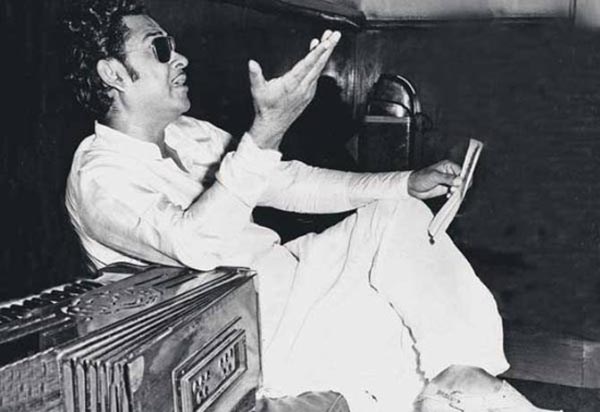
Talking about the Emergency period he once said, “No one can make me do what I don’t want to do. I don’t sing at anyone’s will or command. But I sing for charities, causes all the time.”
In April 1976 when the then Prime Minister Indira Gandhi declared Emergency, Information and Broadcasting Ministry was seeking the help of prominent faces of the film fraternity for promoting the 20-point programme introduced by Gandhi on Doordarshan and All India Radio, the government-owned media houses.
However, Kumar refused to sing or perform on grounds of bad health. This did not sit well with the government and his songs were banned on AIR as well as Doordarshan. Even the sale of his records on gramophone was put on hold. The officials called him curt and his action, grossly discourteous.
Many prominent producers and directors intervened and tried convincing the ministry to lift the ban, but all went vain. Kumar refused to apologise.
When on July 14, 1976, Kumar wrote to the ministry agreeing to extend cooperation, the then I&B Secretary, CB Jain refused to lift the ban immediately by saying, “We may lift the ban; Watch the degree of cooperation that he extends.”
As the Janta Party government collapsed, grey clouds hovering over Kumar disappeared and he continued scaling success.
Quitting the industry
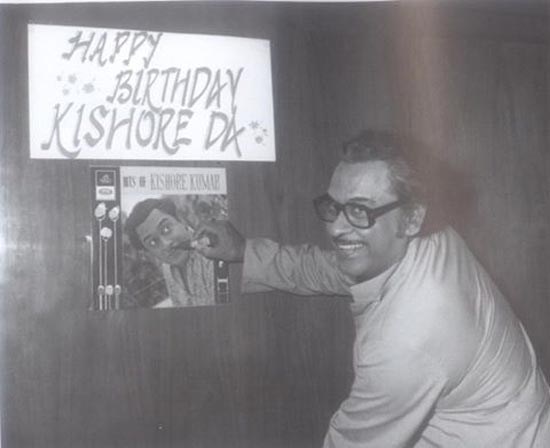
“My actual dues are not much but the interest has piled up. I’m planning to sell off a lot of things before I go to Khandwa and settle this entire business once and for all,” he told in an interview on being asked about his income-tax problems
When it comes to private life, Kumar was always reclusive. He did not want to put on display his life in front of the world. He wouldn’t even agree for interviews or face the paparazzi, let alone sharing his private life. He used to cancel his concerts due to stage fear.
After a successful career that spanned for almost four decades, he decided to quit the industry and head back to Khandwa, his home town in Madhya Pradesh.
“I am 56. I had a heart attack three years ago. And I need rest. I don’t want to retire after people have begun wondering whether I’m still there. And show business doesn’t suit me any longer. Look at the prohibitive taxes for those who are really successful. The tax raids, the complicated laws and bylaws, the hassles – they all make popularity a punishable offence,” he told the media.
“Who can live in this stupid, friendless city where everyone seeks to exploit you every moment of the day? Can you trust anyone out here? Is anyone trustworthy? Is anyone a friend you can count on? I am determined to get out of this futile rat race and live as I’ve always wanted to. In my native Khandwa, the land of my forefathers. Who wants to die in this ugly city?” he added.

To commemorate Kumar’s 85th birth anniversary, Google had launched a doodle in 2014 dedicated to him
India lost its gem to heart attack on October 13, 1987. He acted in 88 Hindi films, recorded 2,678 Hindi songs, produced and wrote the script for 14 films ( six of which were not completed), directed 12 films (four of which were abandoned) and made a record of winning maximum Filmfare awards in the ‘Best Playback Singer’ category.
Asha Bhosle, another veteran singer, once said, “Kishore Kumar was one of a kind. He swayed everyone with his mellifluous voice and even made everyone around him happy always. He has been a true gem to the music industry. I have always enjoyed working with him. It is really impossible for anyone to take his place today.”
Kumar’s contributions to the Indian film industry is unmatchable; he’ll always be cherished by one and all.

